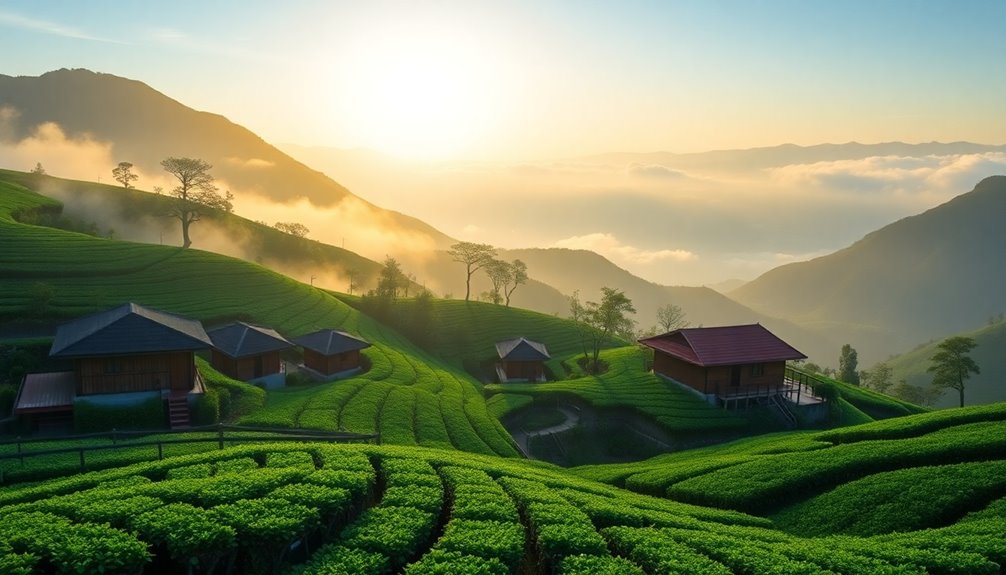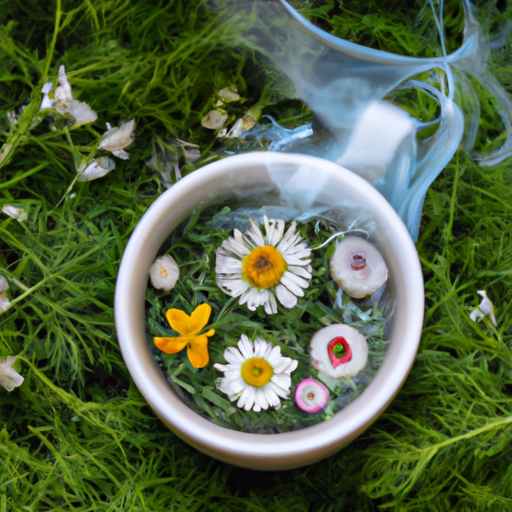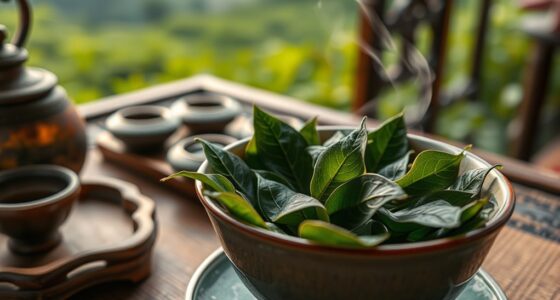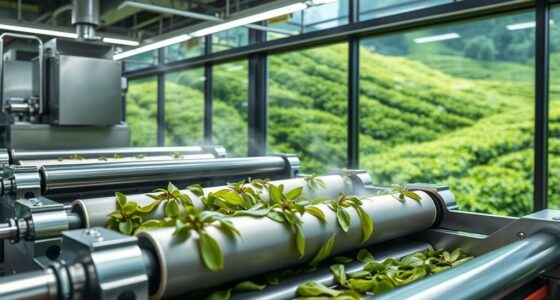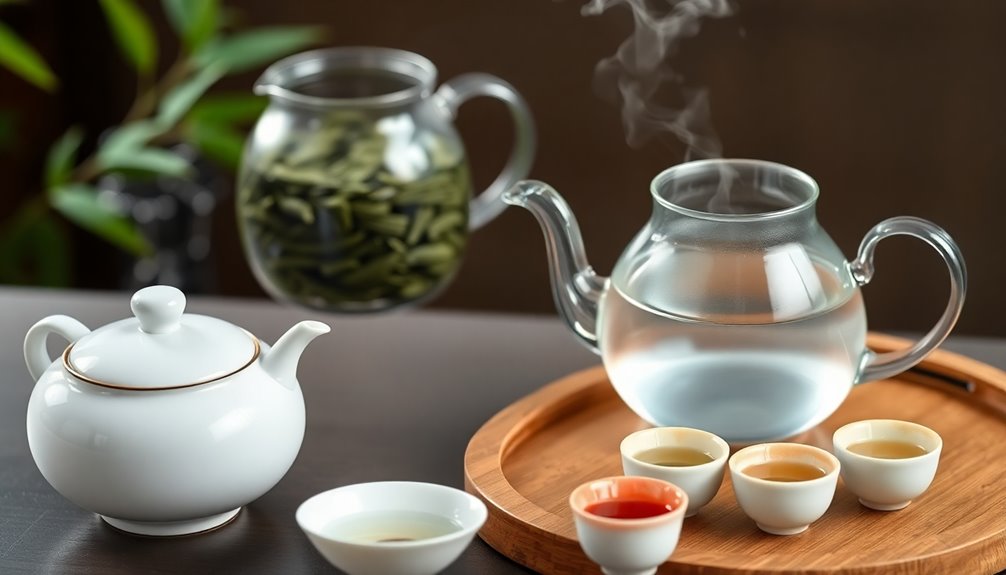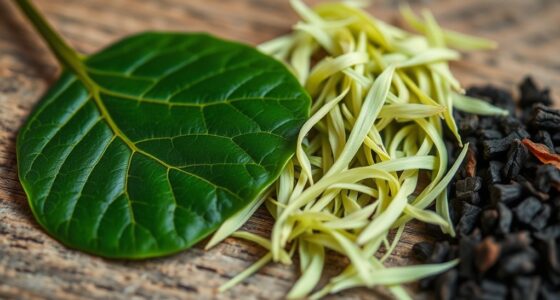Exploring the mountainous tea regions of Taiwan is an exciting journey! You'll discover four amazing areas: Alishan, Shan Lin Xi, Li Shan, and Yushan. Each spot grows high mountain tea at stunning elevations, where cooler temperatures and misty fog create delicious flavors. Here are some highlights:
- Alishan: Known for its famous teas.
- Shan Lin Xi: Birthplace of High Mountain Tea.
- Li Shan: Offers unique tastes at the highest elevations.
- Yushan: Eco-farmed near Asia's tallest peak.
Get ready to enjoy a fantastic tasting adventure, and there's so much more to uncover!
Key Takeaways
- Taiwan's mountainous regions, including Alishan, Shan Lin Xi, Li Shan, and Yushan, are renowned for their unique high-altitude tea varieties.
- High Mountain Tea is cultivated between 1,000m and 3,000m, benefiting from cooler temperatures and misty conditions that enhance flavor development.
- The distinct terroir of volcanic soil and climate results in floral notes and creamy textures characteristic of Taiwan's oolong teas.
- Farmers are adapting to climate change through sustainable practices, ensuring the preservation of unique flavor profiles and biodiversity.
- Each tea region offers a unique tasting experience, reflecting the beauty and complexity of Taiwan's mountainous landscapes.
Introduction
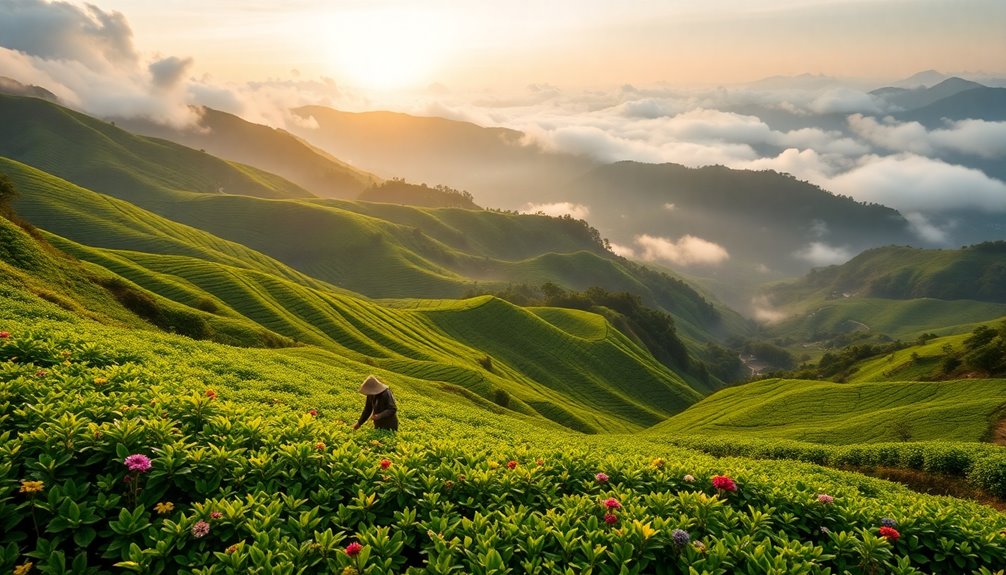
When you think of exquisite teas, Taiwan's mountainous regions should come to mind. Nestled high in the hills, these areas produce some of the best High Mountain oolongs you'll ever taste!
There are four main tea regions in Taiwan: Alishan, Shan Lin Xi, Li Shan, and Yushan. Each offers its own unique flavor profiles that will make your taste buds dance with joy!
- Alishan High Mountain Tea is famous worldwide, thriving at elevations between 1,000m and 1,800m.
- Shan Lin Xi, known as the birthplace of High Mountain Tea, has a rich history dating back to the 1970s and is recognized for its lightly oxidized, unroasted teas.
- Li Shan is the highest, with tea cultivated from 1,800m to 3,000m, creating a special taste despite facing some challenges.
- Yushan, near East Asia's tallest peak, produces unique eco-farmed teas with a competitive edge.
Exploring these beautiful tea regions will fill your heart with happiness and deepen your appreciation for Taiwan's wonderful tea culture!
High Altitude Tea Cultivation
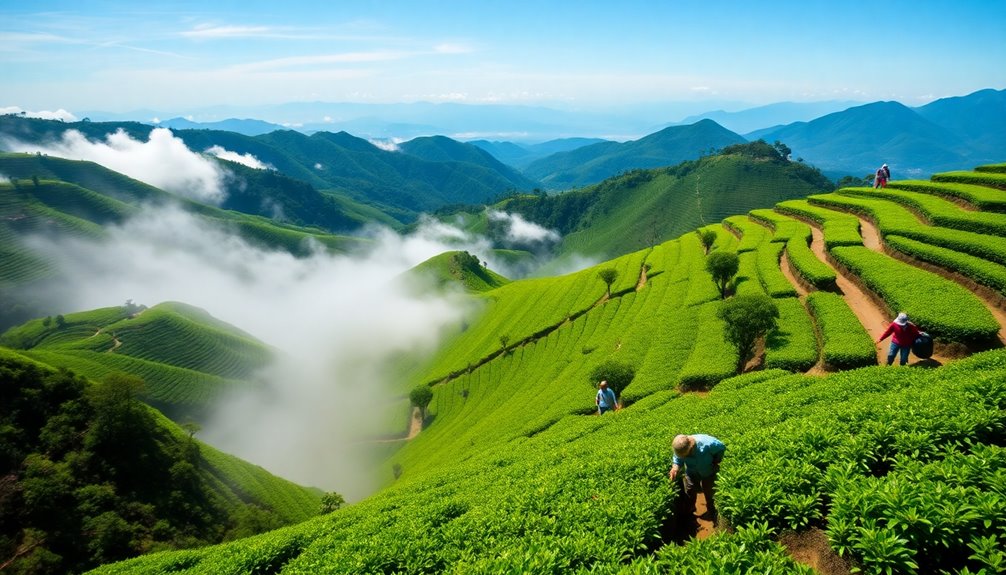
High altitude tea cultivation in Taiwan offers a remarkable experience for both growers and tea enthusiasts alike. You'll find this magic happening in the High Mountain Tea region, where the tea plants thrive at elevations from 1,000 to 3,000 meters.
The cooler temperatures and afternoon fog here create perfect conditions for growing tea leaves, allowing them to develop unique flavor profiles. Because of the slower growth at these heights, the tea leaves become vibrant and complex. Many of these teas are lightly oxidized, helping to keep their fresh and floral notes, which makes them enjoyable for everyone, whether you're a newcomer or a seasoned drinker.
The afternoon fog acts like a cozy blanket, protecting the plants from harsh sunlight and boosting amino acid production. This adds sweetness and a delightful umami flavor to the tea, making each sip a joy.
However, climate change is beginning to affect tea production in these beautiful regions. It's important to cherish and support high altitude tea cultivation, ensuring that future generations can enjoy these incredible teas!
High Elevation Enhances Flavor Profiles
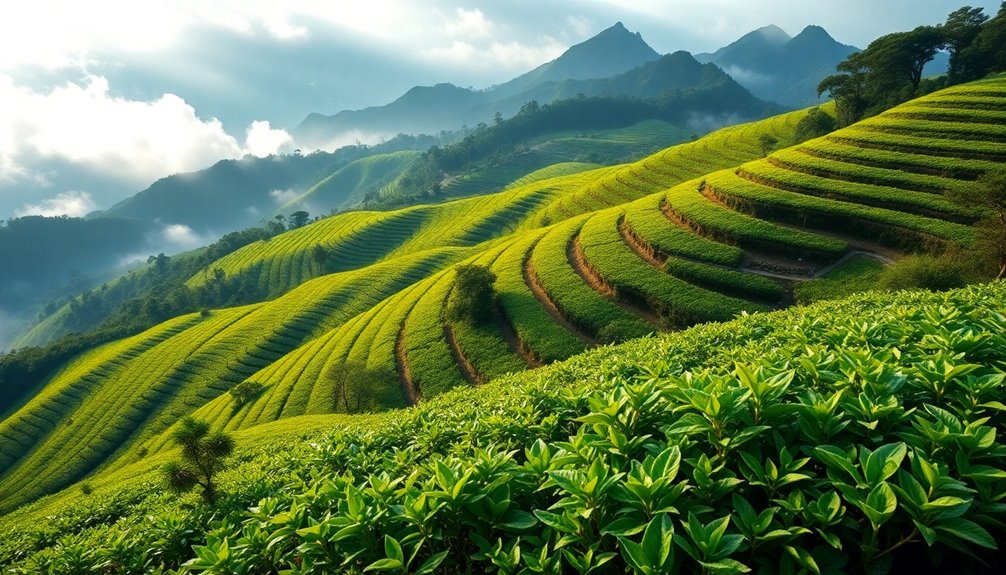
Tea cultivated in Taiwan's high elevation regions, like Li Shan and Alishan, showcases remarkable flavor profiles that set them apart from their lower elevation counterparts. When you sip on High Mountain Oolong Teas, you'll discover a world of complex flavors! The cooler temperatures and daily temperature variations create a perfect environment for growing tea.
Here's why these teas are so special:
- Delicate Floral Notes: You'll notice a lovely floral aroma that dances on your taste buds.
- Rich and Creamy: The creamy texture adds a delightful touch, making each sip memorable.
- Aromatic Compounds: High elevations help produce more amino acids, enriching the tea's taste.
- Unique Terroir: The volcanic soil and misty climate contribute to these teas' character.
These High Mountain Teas are often celebrated as the "Champagne of oolong tea" because of their exquisite flavor profiles.
So, whether you're sharing a cup with family or enjoying a moment alone, these delightful teas promise a flavorful adventure that warms your heart!
Get ready to explore the vibrant world of Taiwanese tea, and let the flavors take you on a journey!
Tea Cultivation at Extreme Altitudes
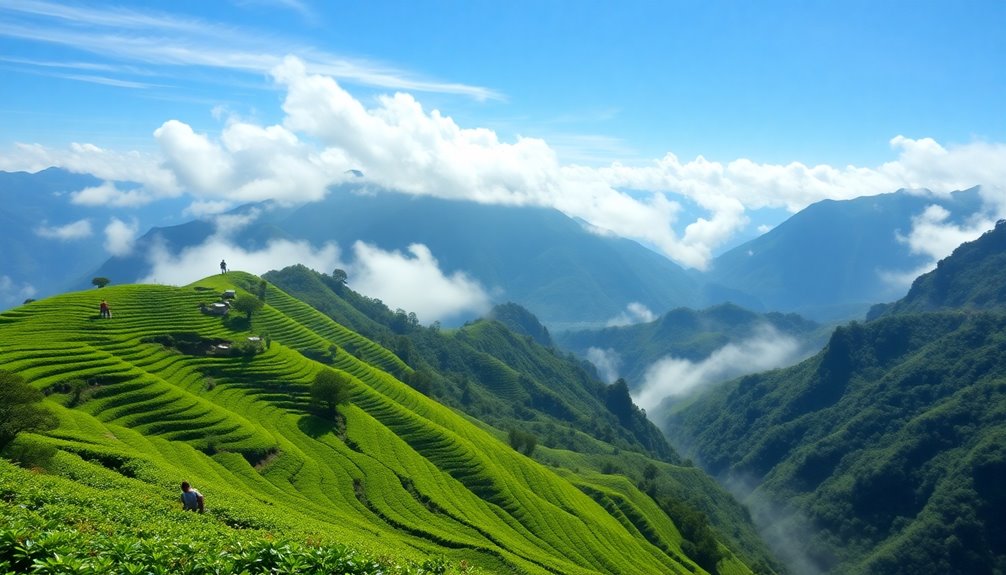
Although many might think of tea as a lowland crop, cultivating it at extreme altitudes in Taiwan reveals a world of unique characteristics and benefits. Nestled in Taiwan's highest elevation, regions like Li Shan soar between 1800m and 3000m, creating ideal growing conditions for tea plants. Here, high mountain teas thrive, developing vibrant, complex flavor profiles that delight the senses.
These high-altitude areas boast special microclimates. Cool night temperatures and morning mist slow down tea plant growth, leading to a higher concentration of amino acids. This means each sip is packed with rich flavors.
Plus, tea cultivated at these heights is often less affected by pests and diseases, making sustainable farming easier and boosting premium tea production.
However, growing tea at such elevations isn't without its challenges. Climatic challenges, like rising temperatures and unpredictable weather, can affect the delicate balance needed to produce these exceptional teas.
Yet, the rewards are worth it! Sipping a cup of Taiwan's high mountain tea is like tasting the beauty of the mountains themselves, making every moment special.
Climate Change Impacts

Climate change significantly impacts tea cultivation in Taiwan's mountainous regions, creating challenges for farmers striving to maintain quality and yield.
As temperatures rise, tea plants bud earlier, which can mess up harvest times and lead to lower flavor quality. Imagine the disappointment when your favorite tea doesn't taste just right!
Extreme weather events, like typhoons and heavy rain, can wreak havoc on tea plants. These storms can damage crops and disrupt harvesting, affecting both yield and quality.
It's like a roller coaster ride for tea farmers, who must adapt quickly to these changes.
Additionally, shifting climate conditions can alter the unique terroir of tea-growing areas. This means the soil composition and health of the microbes that help develop flavor can change, too!
To combat these challenges, tea farmers are exploring sustainable practices. They're finding new ways to care for their plants and protect their precious harvests.
Practical Applications
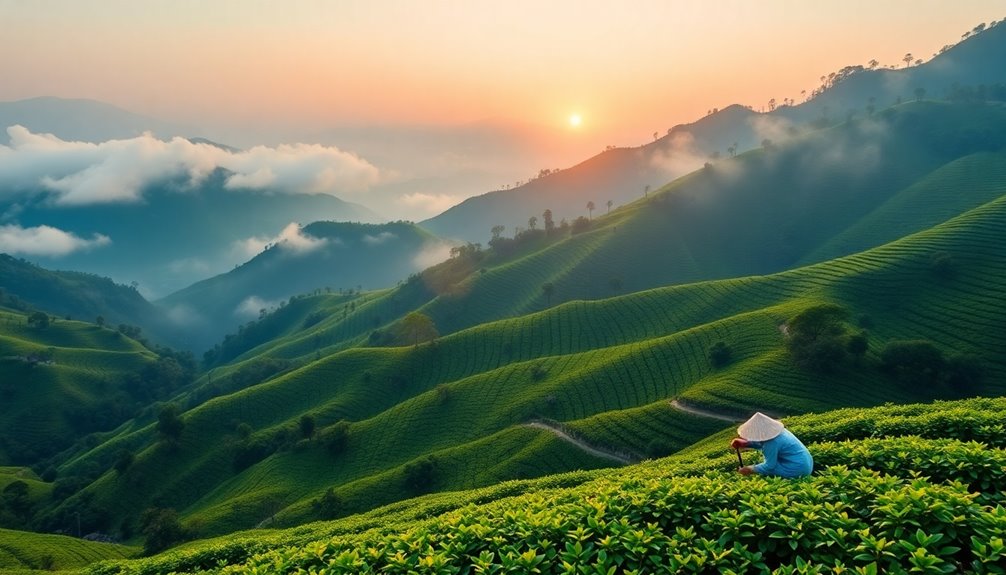
In recent years, tea farmers in Taiwan's mountainous regions have embraced innovative techniques to adapt to the challenges posed by climate change.
They're using smart methods to grow delicious High Mountain oolong tea, which is famous for its complex aromas and flavors.
Here's how they're doing it:
- Organic Farming Practices: Farmers in Yushan are using organic methods, which help keep the soil healthy and tasty! This means you get eco-farmed teas that are truly special. These practices not only enhance flavor but also support soil health by promoting biodiversity. Additionally, organic farming can lead to higher quality produce that is more flavorful and nutritious. This commitment to organic methods can also contribute to vibrational alignment with nature, enhancing the overall quality of the tea. Furthermore, organic farming can help reduce the risk of dental health issues associated with chemical exposure.
- Elevated Plantations: The tea plantations in Alishan and Li Shan, ranging from 1,000m to 3,000m, benefit from cool temperatures and mist. These conditions create vibrant teas that many people love.
- Caring for Quality: Farmers focus on maintaining the unique flavor profile of their Taiwanese teas, even with climate changes affecting their growing region. They are passionate about keeping their traditions alive while adapting to new challenges.
Thanks to these practical applications, you can enjoy a cup of tea that not only tastes great but also supports sustainable tea farming. Additionally, the sustainable practices of tea farming can contribute to the health of soil ecosystems, promoting biodiversity and enhancing the overall agricultural landscape.
Frequently Asked Questions
What Is Taiwan's Most Famous Tea?
Taiwan's most famous tea is Alishan High Mountain Oolong. It boasts vibrant flavors and complex aromas thanks to its high-altitude cultivation. You'll enjoy its floral and creamy notes, making it a favorite among tea lovers.
What Is Mountain Tea in Taiwan?
Mountain tea in Taiwan refers to high mountain oolong tea, known for its rich flavors and aromas. Grown at high elevations, it benefits from unique climates, resulting in a vibrant, creamy taste you'll love.
What Is Tea Etiquette in Taiwan?
In Taiwan, you should accept tea with both hands, appreciating its aroma before drinking. Wait for the host to refill your cup, and gently tap the table if you don't want more. Enjoy the ceremony!
What Is the Best Ali Shan Tea?
The best Alishan tea is the Alishan High Mountain Oolong. Its sweet, smooth flavor and lingering aftertaste, enhanced by unique growing conditions, make it a favorite among tea enthusiasts. You won't be disappointed!
Conclusion
Exploring Taiwan's mountainous tea regions is an adventure filled with rich flavors and beautiful sights! You can sip delicious teas grown at high altitudes, where the cool air makes them extra special. As you learn about tea cultivation, you'll discover how climate change impacts these magical places. So grab your family, and plan a trip to taste and enjoy nature's gifts together! You'll create unforgettable memories while celebrating the wonderful world of tea!

